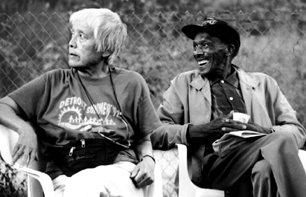It helps that Dianna Lee Inosanto, the lead character/director/producer is amazingly beautiful and a superb martial artist. She is the goddaughter of Bruce Lee and daughter of Dan Inosanto!
Anyways, here's a youtube and the review. Enjoy!!
Here's the article:
Diana Lee Inosanto describes herself as a multi-tasker. The Filipino American stuntwoman, martial arts instructor, actress and mother of two is also the writer and director of a new independent movie, “The Sensei.” Screened in packed theatres at numerous film festivals, “The Sensei” will be playing in the upcoming Seattle Gay and Lesbian Film Festival on Oct. 24.
Lee Inosanto is the daughter of Dan Inosanto, acclaimed martial arts instructor and student of Seattle’s legendary Bruce Lee. Affectionately, she said of her god-uncle, “Uncle Bruce was a role model of diversity for me. He broke down a lot of racial barriers in the ’60s and ’70s. He was a Chinese guy and he hung out with Japanese, Hispanic, Black and Muslim people. He echoed a turn in the time.”
Today, Lee Inosanto echoes the changing perceptions towards sexuality and HIV/AIDS. Carrying on the tradition of breaking down barriers, “The Sensei” tackles with the often unspoken and taboo topics in broader society and martial arts scenes. The harsh experience of an isolated gay youth in the 1980s is central to the movie. He lives in a small town in Colorado and feels the need to learn self defense to protect himself. Unpretentious and occasionally blood chilling, the topics of heterosexism and HIV/AIDS are wide open in the film.
It is not surprising, given that one of the main inspirations of the film was the tragic hate-crime murder of Matthew Shepard in 1998. Attacked and brutalized by two homophobic men, Shepard was killed while tied to a fence, his corpse mistaken for a scarecrow.
“His story came at a time when my cousin came out as a lesbian,” said Lee Inosanto. The timing of the two events made Shepard’s death feel close to home.
“The Sensei” protagonist McClain Evan’s story, however, differs drastically from Shepard’s. Faced with isolation and depression, Evan’s character, played by Michael O’Laskey II, seeks strength and martial arts skills from Lee Inosanto’s Karen O’Neil. With compassion, O’Neil takes on homophobia and trashes it of all its destructive assumptions.
The inspiration for O’Neil’s strength comes from Gilbert Johnson, renowned co-author of Bruce Lee and Dan Inosanto’s books. Johnson, a straight heterosexual man, was diagnosed with HIV/AIDS at the height of anti-gay, anti-AIDS sentiments in the 1980s.
“(Johnson) came out (about being HIV-positive) to the notoriously conservative martial arts scene. It was unheard of,” said Lee Inosanto. Recalling how she respected his ability to overcome his own prejudices and march alongside gay activists, Lee Inosanto added, “(Johnson) left a huge impact on my life.”
Produced on a tight budget, Lee Inosanto’s “The Sensei” was a challenge to fund. Referring to producers who did not understand her film, Lee Inosanto chuckled as she said, “They wanted to make it into a B martial arts film, thinking it could (be) some late night HBO, dragon-style dramatic movie. I wanted to protect my film.”
Her sense of ownership led her and her husband, co-producer Ron Balicki, to seek independent funding sources. When a major investor, repelled by topics that the film was addressing, backed out, the two were left with seeking alternative funding sources, even partially refinancing their home to make up the budget. After seven years of determination, “The Sensei,” a unique film that intricately weaves in Asian American identity, sexuality and the meaning of community, sets itself apart from the rest.





No comments:
Post a Comment